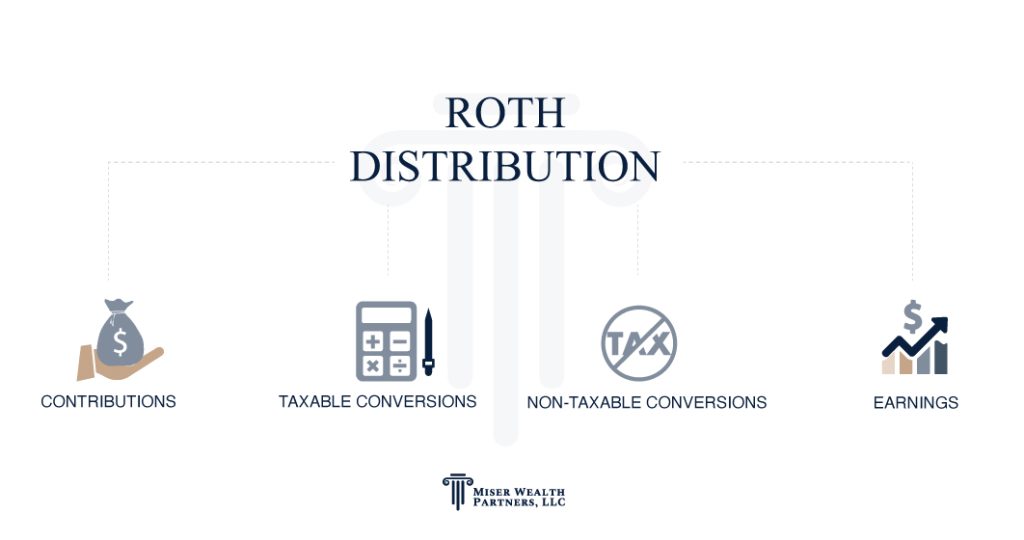A Roth IRA can offer several enticing benefits over traditional IRAs. The tax savings alone make Roth IRAs a very attractive option for those who expect to be in a higher tax bracket upon retirement age. What we have found at Miser Wealth Partners is that many affluent retirees sometimes make errors when calculating and conducting Roth conversions. Our advisors are skilled at Roth IRA conversions and can help you avoid any potential mistakes through our Roth conversion analysis.
What is a Roth IRA?
A Roth IRA is an Individual Retirement Account that you contribute after-tax income, and your contributions and earnings can grow tax-free. As long as your account has been open for at least five years and you are over age 59½, and you can withdraw your savings tax-free and penalty free. Roth IRAs can be an especially good retirement savings tool for people in a higher tax bracket who wish to set money aside for potential growth. In addition to potentially boosting retirement savings, Roth IRAs can offer more flexibility for you and your heirs due to their unique tax rules.

What are some common mistakes to be aware of when converting to a Roth IRA?
Through our years of experience in dealing with Roth IRA conversions, we’ve helped our clients identify and prevent/correct a host of common mistakes, which include:
- Failing to consider tax implications: Roth conversions involve converting traditional retirement account funds into Roth IRA funds, which can have significant tax implications. Affluent retirees should carefully consider the tax consequences of a conversion, including the impact on their current tax liability and potential future tax savings. Failing to account for these tax implications can result in unexpected taxes or missed opportunities.
- Not evaluating the optimal conversion amount: Some retirees may convert more funds than necessary to a Roth IRA, which can lead to unnecessary tax liabilities. It’s important to evaluate the optimal conversion amount that balances current tax considerations with long-term tax planning goals. This may involve projecting future income, assessing tax brackets, and considering the impact on Social Security taxation, Medicare premiums, and other factors.
- Overlooking state tax considerations: While Roth conversions have federal tax implications, you should also consider the state tax consequences. Tax rates and rules can vary significantly from state to state. Overlooking these factors can lead to unexpected state tax liabilities.
- Converting during high-income years: Converting a traditional IRA to a Roth IRA triggers taxable income in the year of the conversion. It’s important for those converting to evaluate their income levels during the conversion year, as converting during high-income years may push them into higher tax brackets and result in higher tax rates. Timing the conversion during lower-income years can help minimize the tax impact.
- Neglecting the five-year rule: Roth conversions are subject to a five-year rule, which determines when tax-free withdrawals can be made from the converted funds. It’s important to understand this rule and plan your conversions accordingly to ensure you meet the requirements for tax-free distributions.
- Failing to consider estate planning implications: Roth conversions can have implications for estate planning. Affluent retirees should consider how Roth IRAs fit into their overall estate plan, including the potential benefits of leaving tax-free assets to their beneficiaries. Failure to consider these factors may result in missed opportunities to optimize estate planning strategies.
- Not reversing or “recharacterizing” conversion mistakes: In some cases, affluent retirees may realize that a Roth conversion was not beneficial or that they converted more funds than necessary. Failing to take advantage of the ability to reverse or “recharacterize” conversions within specific timeframes can result in unnecessary tax liabilities. Miser Wealth Partners can help you with the rules and deadlines for recharacterizing conversions if needed.
Why choose Miser Wealth Partners for your Roth conversion analysis?
What we want people to understand is that you don’t have to go it alone and try to navigate all the intricacies of Roth IRA conversions on your own. Our knowledgeable team of advisors can take the guesswork out of the equation and help you avoid these and other potential errors. We can help you assess your unique financial situations, analyze tax implications, and develop strategies that align with your retirement goals and long-term tax planning objectives.
What’s my next step in converting to a Roth IRA in East Tennessee?
Converting to a Roth IRA may seem like quite a bit of work, but Miser Wealth Partners can make it much easier for you. Call us at (865) 281-1616 or click here to schedule a time to meet with us. We’ll work with you throughout the conversion process to help you cash in on all the potential advantages and enjoy the most benefit out of your retirement.







